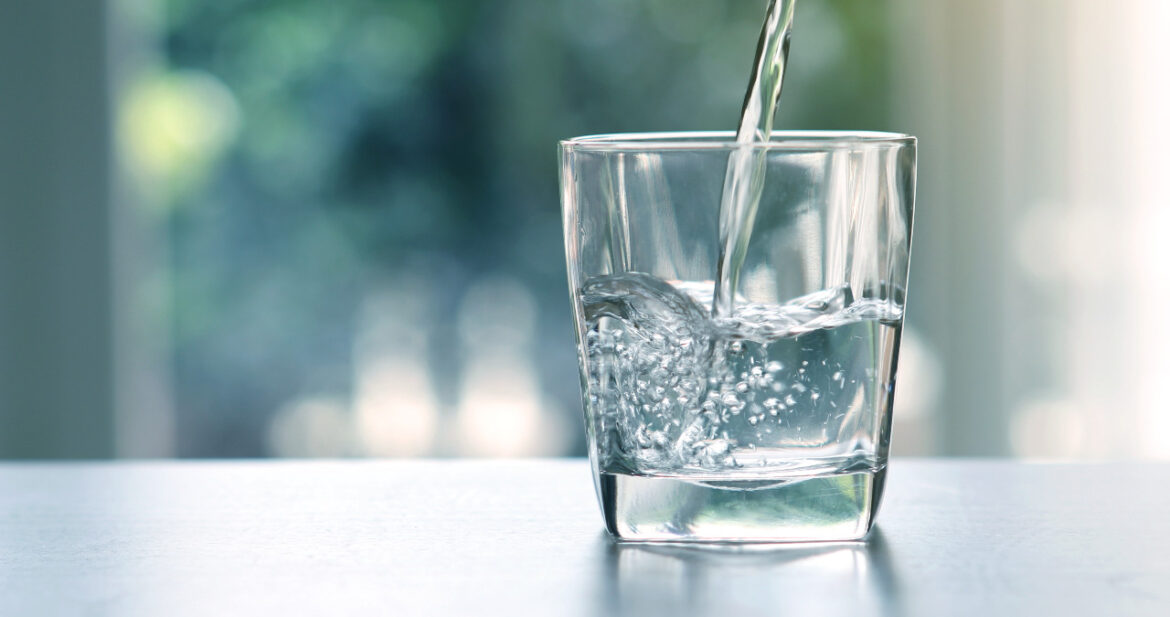Water is the most important nutrient in the body. It makes up at least 60% of the adult body
(on average that’s about 10 to 13 gallons of water!) and it is the primary component of all bodily fluids, including the blood, lymph, digestive juices, urine, tears, and sweat. Our requirements for water vary greatly from person to person, and our individual needs are affected by factors such as the climate in which we live, our activity level, and our diets.
Water is the most abundant substance on Earth and in the human body yet ironically dehydration is one of the most common nutrient deficiencies. Some of the commonly overlooked symptoms of dehydration include digestive disturbances such as heartburn and constipation, urinary tract infections, premature aging, high cholesterol, weight gain, and autoimmune diseases such as chronic fatigue syndrome and multiple sclerosis.
Water is fundamental to optimal health. Although most are aware of the benefits of water in maintaining a healthy body weight and improving our skin, it actually plays a role in almost every bodily function. In fact, it is so essential that we can only survive for a few days without it.
Transporting nutrients
Water helps to transport nutrients, hydration, and oxygen to our cells. Nutrients and other necessary elements must be delivered throughout the body to ensure proper functioning of every process, from respiration to muscle contractions to digestion and waste removal.
Cell-to-cell communication
Proper hydration allows cells to communicate with each other more easily and maintain their proper electrical charges.
Protecting tissues
Water helps to lubricate and cushion bones and joints, absorb shocks to the body, and regulate body temperature. It moistens the air for easier breathing and is also important to the health of our eyes and mouth, both of which require lots of moisture for proper functioning.
Joint health
Water is critical in helping to decrease pain and inflammation in our joints. Due to water’s ability to reduce inflammation and promote cartilage health, proper hydration has been indicated in the prevention of chronic joint diseases such as rheumatoid arthritis.
Improves overall health
Adequate water consumption has been shown to slow signs of aging, including dry skin and wrinkles, while also improving conditions such as constipation, obesity, and kidney stones.
Natural healing
Water is key in our ability to heal. When we are injured, our bloodstream, which is about 80% water, carries repair substances to the injury site. When toxic substances from the environment invade our bodies, our urine (approximately 95% water) or our sweat (approximately 99% water) carries the toxins back out. Skin wounds heal more quickly in a wet environment because water accelerates the growth of new skin.
Natural detoxification
Water helps to naturally detoxify the body by flushing out toxins and wastes. In the absence of enough water to carry these byproducts out of our bodies, we risk becoming toxic and compromising our overall quality of life. The kidneys play a critical role in helping the body to remove water and waste. If the kidneys don’t get the water that they need to perform this function, then this leads to deteriorating health.
How Much Water Should You Drink?
To be adequately hydrated, it is recommended that you drink half of your body weight in ounces of pure, filtered water per day. This means that a 150-lb person needs to drink 75 ounces of water daily. However, certain foods and drinks are natural diuretics, meaning that they increase and encourage urine production, resulting in water loss. So, to offset this diuretic effect, additional water needs to be consumed. The extra volume is calculated by multiplying the number of ounces of diuretic beverages consumed by 1.5 and adding that amount to your recommended total daily intake of water. So, if this 150-lb person drinks 16 ounces of coffee every morning then an additional 24 ounces of water will need to be consumed, increasing the total daily intake of water from 75 to 99 ounces!
Absorption is Key
Drinking enough water is key to feeling well. However, if we are unable to properly absorb and utilize the water then the benefits of drinking the correct quantities are lost.
Add salt and lemon
A small pinch of unrefined sea salt and a squeeze of lemon is a perfect way to upgrade your water. Unlike refined table salt, sea salt contains dozens of minerals, including electrolytes that help in absorption. Lemon aids in digestion and also helps with the taste, improving the chances that you will drink more.
Minimize diuretics
Many of the drinks that people enjoy the most, like coffee, tea, soda, alcohol, sports drinks, and even fruit juice, can cause dehydration. These beverages, and their supersized servings, are a ritual in our daily routines and are difficult for many people to give up. In fact, the quantities consumed are so excessive that it is unlikely that a person would be able to drink the amount of water necessary to offset the diuretic effect. And, expecting a person who religiously drinks
5 cups of coffee each morning or 3 sodas with lunch to switch entirely to water is probably unrealistic. So, as with any major lifestyle change it is important to start slowly. Instead of eliminating coffee completely from your daily routine, try instead to replace one-half to 1 cup of coffee for an equal amount of water. The small but manageable swap will not only improve your hydration but will also moderate frustration levels during the transition. Over time, as your body adjusts, it will become more natural to “trade and upgrade” and it will be easier to swap small quantities (about 4 ounces) at a time, every 3 to 4 weeks.
Sip Water Between Meals
Though a small amount of water with a meal is fine, too much water can dilute your stomach acid and negatively affect digestion. When possible, regularly sip small amounts of water between meals instead to optimize both digestion and hydration. When you drink too much water too fast you inevitably must use the bathroom, which defeats the purpose.
Not All Water is Created Equal
It is important to know the source of the nutrients that we are putting into our bodies. Not only does this apply to the food that we eat but also to the water that we drink. However, this is not always an easy task, especially when faced with an abundance of choices, convenient packaging options, and clever marketing schemes. Hydration is critical, but our health is ultimately dependent on the quality of the water that we drink.
Tap water
Most tap water comes from groundwater or surface reservoirs. The water from these sources goes through local treatment plants where it is cleaned with chemicals to make it fit for human consumption. However, this process is not guaranteed to remove environmental pollutants such as fertilizers and insecticides, industrial waste, or air pollutants. In some townships, fluoride is added to the water to promote dental health. This water supply is monitored by the Environmental Protection Agency, a group that sets standards to ensure that public water systems do not exceed allowable amounts of contaminants without legal penalty. These standards do not certify that the tap water is clean, rather, they just confirm that the public drinking water does not contain more contaminants than what the government deems safe to drink! Therefore, it is highly recommended that all tap water is appropriately filtered to remove impurities before consumption.
Well water
Well water primarily comes from groundwater supplies. It has the potential to be rich in healthful minerals such as iron, zinc, selenium, magnesium, and calcium although the levels of minerals in well water can vary greatly. However, because groundwater may also contain bacteria as well as toxic heavy metals or chemical pollutants such as pesticides, herbicides, or radon, it should always be tested and analyzed for before drinking.
Distilled water
Distilled water is a type of purified water that results when water is boiled into a vapor and condensed back to liquid. During this process, most of the contaminants in the water are boiled out. It is not dangerous to drink distilled water, and because it is free of dissolved minerals, it is very effective in being able to actively absorb and eliminate toxic substances from the body. At the same time however, because it lacks important minerals and nutrients, the water is very acidic. Therefore, drinking distilled water for extended periods of time may deplete your mineral reserves, resulting in deficiencies.
Bottled water
The practice of bottling and selling water has a long history in the United States dating back to the late 19th century when people would “take” the waters at resorts such as Saratoga Springs in New York. The big appeal of these waters was their supposed health benefits. Companies like Poland Springs profited from this mindset by marketing their product in a way that conjures up images of pristine underground springs from which their waters are sourced. In reality however, up to 40% of the water contained in bottles comes from tap water. Most of this water is also conveniently packaged in disposable plastic bottles, which have been linked to our declining health while contributing to the damage in our ecosystem.
Alkaline water
Alkaline water has a higher pH level than regular drinking water and advocates believe that it can neutralize acid in the body. Many people who drink alkaline water initially feel good, most likely due to better hydration. However, over time, the high pH can neutralize the acidic environment of the stomach, resulting in issues with digestion. It can also affect bone health due to the decrease in free calcium in the body.
Vitaminwater
Vitaminwater, which is owned by the Coca-Cola Company is the latest water trend that is marketed as healthy because of added vitamins and minerals. Vitaminwater contains vitamins B and C, however, because they are water soluble vitamins, most people are not deficient in them. The added vitamins are not harmful but what makes Vitaminwater unhealthful is that in the United States, it is sweetened with crystalline fructose, which is essentially pure sugar. The overconsumption of sugar in the Standard American Diet is contributing to the obesity epidemic and other diseases such as type 2 diabetes, tooth decay, heart disease, metabolic syndrome, and even cancer. The bottom line? If you are looking to get more vitamins into your diet, it would benefit your health to get them from nutrient-dense whole foods rather than a sugary, processed beverage.
Filtered water
Filtration involves the removal of chemicals, metals, or bacteria from the water. Due to concerns with water quality, more and more people are purchasing filtration units or systems for their homes. Filtering options range from carbon filters to reverse osmosis.
Water pitchers such as Brita, Maeva, and Pur use granular carbon filters. They are a low-cost investment that works well to provide cleaner and better-tasting water. Carbon block filters are the best overall option as they are extremely effective and affordable for most people. Some of these systems, like the Berkey, filter the contaminants so well that they purify the water without removing any of the beneficial minerals. Look for NSF-approved filters, which have been tested and certified for residential use. Reverse osmosis is a water treatment process that removes contaminants by using pressure to force the water through a semipermeable membrane. Aside from being very expensive, reverse osmosis systems remove everything from the water, including important trace minerals like iron and manganese.
Pure mountain/spring water
This is water in its purest form and the pH is in the ideal range for our bodies. In Washington state, it comes from a glacier-fed artesian well. There are no disadvantages to this water except that most people do not live in an area where they have direct access.
References
- Batmanghelidj F. The water cure website. https://www.watercure.com/index.html. Updated 2008. Accessed November 5, 2018.
- Bjarnadottir A. 5 reasons why Vitaminwater is a bad idea. Web site. https://www.healthline.com/nutrition/5-reasons-why-vitaminwater-is-a-bad-idea. Written November 1, 2018. Accessed November 4, 2018.
- Goldman R, Nagelberg R. Alkaline water: benefits and risks. Web site. https://www.healthline.com/health/food-nutrition/alkaline-water-benefits-risks. Written August 29, 2018. Accessed November 4, 2018.
- Haas EM. Water. In: Staying healthy with nutrition. The complete guide to diet and nutritional medicine. Berkley, CA: Celestial Arts;1992;13-27.
- Moss R. How bottled water became America’s most popular beverage. Web site. https://www.seriouseats.com/2017/07/how-bottled-water-became-americas-most-popular-beverage.html. Written on July 10, 2017. Accessed November 4, 2018.
- Module 8: Hydration (audio/video). Nutritional Therapy Association. The Nutritional Therapy Association’s course for NTPs. (2018). Accessed November 3, 2018.
- NSF the public health and safety organization website. http://www.nsf.org/services/by-industry/water-wastewater/residential-water-treatment. Updated 2018. Accessed November 5, 2018.
- Rona ZP. Early death comes from drinking distilled water. Web site. https://www.mercola.com/article/water/distilled_water.htm. Accessed November 4, 2018.
- Silver N. Why water is important? 16 reasons to drink up. Web site. https:/www.healthline.com/health/food-nutrition/why-is-water-important#takeaway. Written March 20, 2018. Accessed November 4, 2018.




